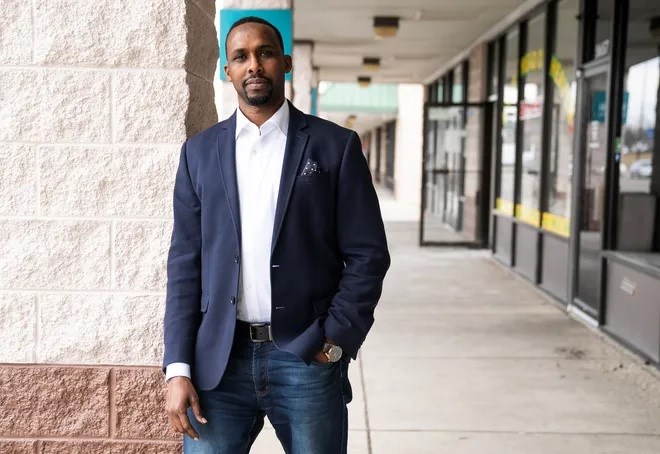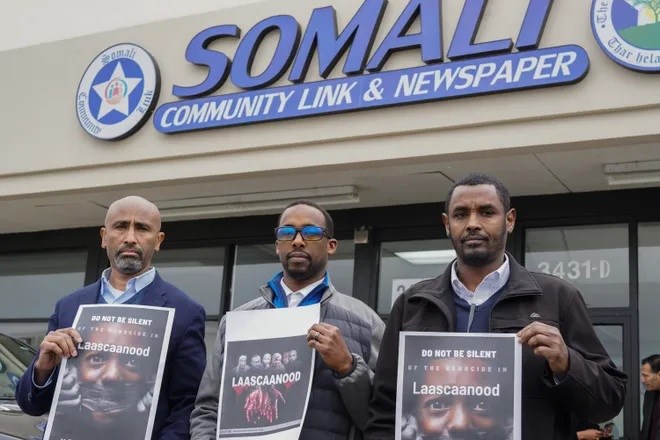
Thursday January 12, 2023
By Peter Gill
 Yassin Mohamed, 40, an insurance agent from Columbus' Minerva Park neighborhood, opposes the breakaway government of Somaliland. Brooke LaValley/Columbus Dispatch
Yassin Mohamed, 40, an insurance agent from Columbus' Minerva Park neighborhood, opposes the breakaway government of Somaliland. Brooke LaValley/Columbus DispatchThirteen-year-old Ugbad Khalif was visiting her grandmother in Somalia last month when violence erupted on the streets of the town where she was staying.
For almost two weeks, her mother on Columbus' Northeast Side heard nothing while international news agencies reported that a least 20 people were killed after the government of the breakaway region of Somaliland cracked down on protesters.
Through a translator, Fadumo Khalif, 37, told The Dispatch she was relieved to finally learn that her daughter was safe after regaining communication with her this past weekend. She is arranging for Ugbad's quick return home from the town of Lasanod, which Somaliland forces withdrew from Jan. 5.
The recent unrest has highlighted the close ties between Columbus' Somali American community as well as the differences in opinion about Somaliland, a northwestern region of Somalia which declared independence from the rest of the country in 1991 but remains unrecognized by any foreign country.
Greater Columbus' Somali community numbers around 45,000 to 50,000 people, many of whom were driven from their homes by decades of civil war and political instability since the 1990s, according to the nonprofit Somali Community Association of Ohio. It is the second-largest Somali community in the U.S. after Minneapolis-St. Paul.
Many Somali Americans maintain connections to Somalia, which has benefited significantly from funds sent home by the diaspora. Somalis abroad sent around $1.7 billion to Somalia in 2021, of which approximately $210 million came from the United States, according to the World Bank.
Kawther Musa, a Somali American and a member of Columbus' Northeast Commission, estimated that more than 15,000 Somalis in central Ohio, including herself, come from northern and northwestern parts of Somalia, including areas under the control of the Somaliland government.
 From left: Abdi Hirad, Yassin Mohamed, and Keize Golongol at a press conference Friday attended only by The Dispatch and held at the nonprofit Somali Community Link on Columbus' Northeast Side to discuss recent violence in Somalia. Peter Gill
From left: Abdi Hirad, Yassin Mohamed, and Keize Golongol at a press conference Friday attended only by The Dispatch and held at the nonprofit Somali Community Link on Columbus' Northeast Side to discuss recent violence in Somalia. Peter Gill
In Columbus, some characterize Somaliland as a beacon of hope and functioning democracy in the Horn of Africa, while others, like Musa, say the recent violence is an indicator of the breakaway state’s repressive nature.
"Casualties and suffering should be avoided at all costs," she said.
Musa was part of a local Somali American group that held a press conference on Friday attended only by The Dispatch. The dozen people there called on the international community to ensure humanitarian assistance to Lasanod and cease aid to the Somaliland government.
“All of us here are U.S. citizens, and we are very concerned about the situation, and we want the U.S. to put pressure on this rogue, secessionist regime,” Yassin Mohamed, 40, an insurance agent from Columbus' Minerva Park neighborhood, said of Somaliland's leadership. Mohamed immigrated to the U.S. from Lasanod.
Abdi Hirad, 57, a Somali American economist from Washington, D.C., whose parents live on Columbus' Northeast Side, urged the U.S. during the press conference to discontinue aid to the Somaliland government. Instead, he said aid should be provided through independent city administrations in the area.
Others are more supportive of the breakaway region. Ali-Guban Mohamed, 58, of Lewis Center, founded a grassroots group called American Friends of Somaliland Republic.
Ali-Guban Mohamed, 58, of Lewis Center, founded a grassroots group called American Friends of Somaliland Republic. Courtesy of Ali-Guban Mohamed
“Somaliland wants to become recognized because it’s a democratic state, it’s held many elections. While Somalia — nothing. Chaos, lawlessness, and terrorism," he said.
Abdiwali Ahmed, 35, a home healthcare nurse on Columbus' Northeast Side who immigrated from Somaliland in 2005, said he continues to visit regularly and is proud of Somaliland's democracy.
“Many people express their political opinions, and when you are voting, you vote for who you want, and against who you don’t want," he told The Dispatch. While agreeing recent violence in Lasanod was unfortunate, he said it had been exaggerated on social media.
While Somalia’s center and south were colonized by Italy, the northwest, where Somaliland is located, was colonized by the British. Somaliland joined Somalia after the end of colonialism in 1960, but declared independence in 1991 and has since developed many elements of a state, pursuing economic development and regular elections, according to the International Crisis Group.
Somaliland's current president, Muse Bihi Abdi, however, has been accused of democratic backsliding after postponing elections in November.
Community members say that clan allegiances dominate politics in much of Somalia and Somaliland. Lasanod, where the recent crackdown occurred, is home to many members of the Dhulbahante clan, who are a minority in Somaliland.
Although Somaliland is not recognized by any foreign country, recent oil discoveries on Africa’s east coast have led international companies to sign exploration agreements with the Somaliland government as well as with Somalia.
The U.S. government provided more than $870 million in aid to Somalia in 2022, including for food security amidst an ongoing drought that has hit southern regions hardest.
The U.S. has also provided aid to Somaliland over the years to support democratic elections and institutions, economic development, and humanitarian relief in response to conflict and natural disasters, according to a State Department spokesperson.
“The vast majority of U.S. assistance delivered in Somaliland is provided directly to the population in Somaliland through the UN system and third-party implementers rather than government authorities,” the spokesperson wrote in an email to The Dispatch.
Trustworthy information about the recent violence is hard to come by, the State Department spokesperson said.
“We have seen media reports offering varying assessments of individuals killed, wounded, or detained in Lasanod," the spokesperson wrote. "Reliable information is difficult to obtain, and the United States is not in a position to verify the numbers that have been reported. ... The United States continues to call for calm and de-escalation of tensions in Lasanod."